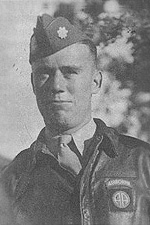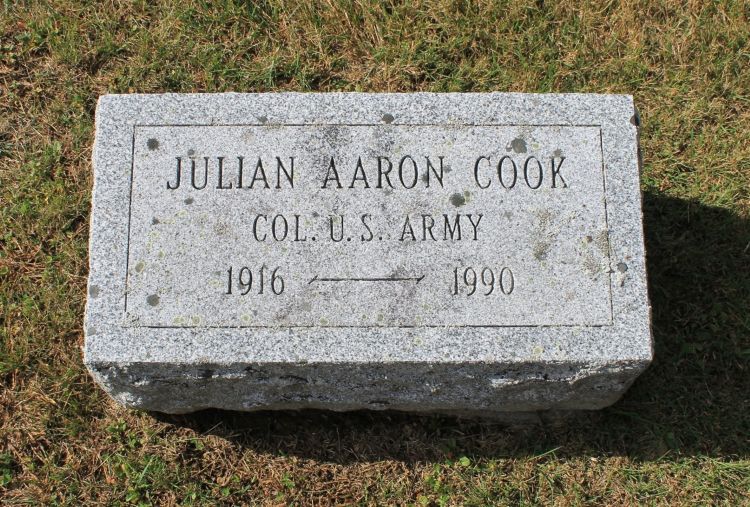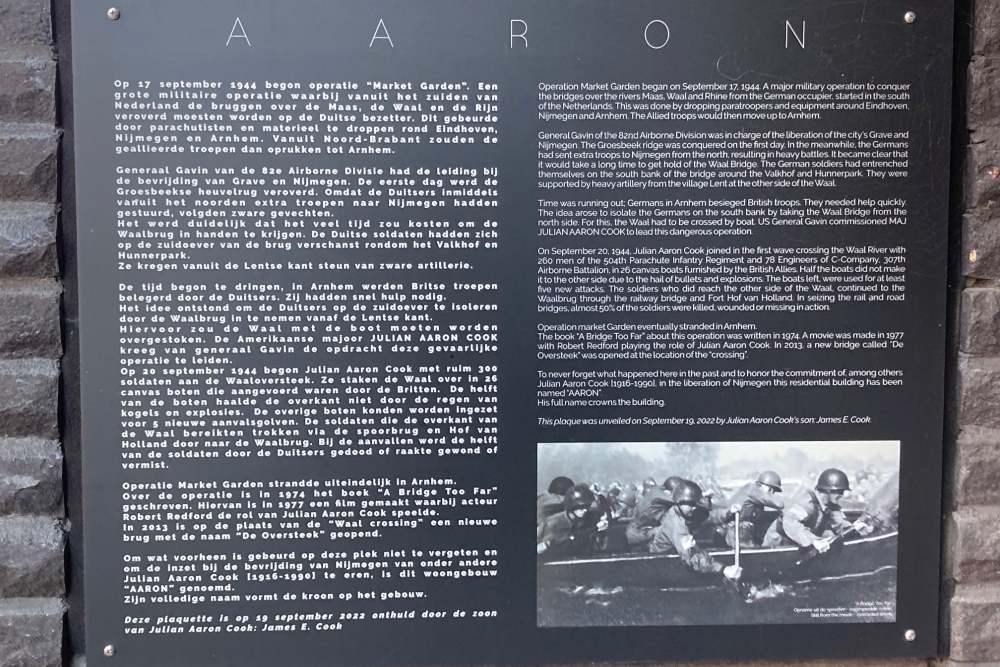Cook, Julian Aaron "Joe"
- Date of birth:
- October 7th, 1916 (Mount Holy/Vermont, United States)
- Date of death:
- June 19th, 1990 (Columbia/South Carolina, United States)
- Service number:
- O-23290
- Nationality:
- American
Biography
Julian Aaron Cook was born on 7 October 1916 in Mount Holly/Rutland County, Vermont, in the United States of America. He was the youngest child of Nelson Pingrey Cook and Honora Gallagher, and had five brothers and three sisters. Little is known about his youth. He started his military career in 1936 as a cadet at West Point Military Academy. He graduated there in 1940 and was assigned to the 9th Division in Fort Bragg as 2nd lieutenant infantry. In 1941 he voluntarily joined the Airborne Forces. In March 1942 he successfully completed his paratrooper training and was assigned to the 504th Parachute Infantry Regiment (PIR) as regimental Adjutant. Sometime later he was promoted to captain after which he became executive officer (XO) of the 3rd Battalion of the same regiment.
In March 1943 he became head of the section S4 (logistics) of the 504th PIR and was promoted to major. On the 12th of July he made his first combat jump during operation Husky, over Sicily, and barely escaped death when dozens of transport planes were shot down by own troops. He was wounded by shrapnel in his side and his thigh. This, however, didn’t prevent him from his second combat jump at the landing near Salerno (operation Avalanche) in September 1943. In January 1944 Julian with his regiment was part of the amphibious landing at Anzio (operation Shingle). The rest of the 82nd Airborne Division was already transferred to England. The 504th PIR with Julian, rejoined their Division in April 1944. Unfortunately, the regiment was too much weakened by the heavy losses suffered in Italy, that it was decided that the 504th wasn’t ready for D-Day in Normandy and was excluded from that operation.
Cook in the meantime was, assigned as commander of the 3rd Battalion, when in September 1944, he was to deploy during operation Market Garden and landed near Nijmegen with his battalion. The 504th PIR executed its mission and successfully conquered the bridges over the Maas river and the Maas-Waal channel. When several attacks on the Waal bridges were unsuccessful, it was decided that Julian’s 3rd Battalion was to cross the river by boat, to seize the northern approaches and ramps of the bridges. Under murderous enemy fire he lead his battalion across the river and, despite their heavy losses, gained the objectives and secured both bridges intact in the early evening of the 20th September 1944. For his exemplary and heroic conduct Julian received, next to a Distinguished Service Cross, the knighthood in the Dutch Military Order of William grade 4. After two days of heavy fighting on the northern shore of the Waal river, his unit was replaced and withdrawn to the south side of the river. There the troopers of the 504th PIR were to defend the eastern flank of Nijmegen against several enemy attacks until mid-November.
On 14 November 1944, the 82nd Airborne Division was pulled out to North France, in the vicinity of Reims/Mourmelon, for recuperation and relief. The regiments received new replacements. Then the Germans launched their surprise counter offensive on 16 December 1944 in the Ardennes. Early morning of the 18th December Cook, already promoted to lieutenant colonel, with his 3rd Battalion, 504th PIR, and the rest of the 82nd was transported in a hurry to the vicinity of Werbemont in an effort to stop the German offensive. The 504th PIR, with Julians battalion, seized the bridges across the Ambleve river near Cheneux and finally stopped the enemies advance, after the 505th PIR had achieved a similar objective near Trois-Ponts. The 504th PIR suffered heavy losses. After Cheneux, Julian’s battalion, with its regiment, successfully deflected several enemy attacks, amongst others near Bra, and then succeeded to conquer the complete western shore of the Salm river. End of January 1945 the 82nd Airborne Division pushed to the Siegfried Line, which was, despite heavy losses, breached in early February. The following months Julian, with his troopers, pushed further into Germany to finally reach Ludwigslust in early May 1945. There the troopers were confronted with one of the monstrosities of the Nazi-regime; Julian’s men came across the concentration camp of Wöbbelin. After the capitulation of the Nazy Army, Cook stayed in Germany and, with the 82nd, the 504th PIR became part of the occupying forces in and around Berlin. End November the 82nd was relieved and its troopers, with Julian Cook, returned via England, on 3 January 1946 to the United States.
Julian would stay in the Army until 1968 and held different postings, in the US and abroad. Then he finally retired from military service as a ‘full bird’ colonel. Following he would become member of the Court of Appeal of the State of South Carolina.
Regarding his private life, Julian married his loved one, Ruth Mary Flynn, on 14 August 1946. They would get two sons and two daughters. Their oldest son, James E. Cook, unveiled an monumental plaquette on 19 September 2022 at the entrance of the apartment complex that was named after his father.
Julian Aaron Cook died on 19 June 1990, at the age of 73, after fighting a long lasting battle against Parkinsons disease, in Columbia/Richland County, South Carolina. He was buried at the Pleasant View Cemetery in Ludlow/Windsor County, Vermont, the United States of America.
Do you have more information about this person? Inform us!
- Period:
- Second World War (1939-1945)
- Rank:
- Lieutenant Colonel
- Unit:
- Commanding Officer, 3rd Battalion, 504th Parachute Infantry Regiment, 82nd Airborne Division "All American", U.S. Army
- Awarded on:
- October 8th, 1945
- Awarded for:
- Operation Market Garden
Royal Decree dated October 8th, 1945 Nr. 31
Royal Decree No. 31 dated October 8th 1945.
- Period:
- Second World War (1939-1945)
- Rank:
- Major
- Unit:
- Commanding Officer, 3rd Battalion, 504th Parachute Infantry Regiment, 82nd Airborne Division "All American", U.S. Army
- Awarded for:
- Operation Market Garden
Major Julian A. Cook, Infantry, distinguished himself on 20 September 1944 at Nijmegen, Holland. Major Cook, Commanding Officer, 3rd Battalion, 504th Parachute Infantry, led his battalion with unparalleled bravery in the initial assault wave during the daring daylight crossing of the Waal River. Although his boatload suffered heavy casualties as a result of the incessant enemy small arms and artillery fire which raked the 250 yard wide stream, he guided the barge safely ashore. Although still under heavy fire, Major Cook remained on the river bank directing the remainder of his battalion coming ashore. On several occasions he plunged back into the river to pull damaged boats ashore and to care for the wounded. During the crossing heavy casualties were suffered, but Major Cook quickly reorganized the remainder of his battalion and led it successfully from objective to objective during the 4000-yard attack, until the north end of the Nijmegen bridge was reached and seized. Major Cook's thoroughness in effecting rapid reorganization and consolidation after the seizure of each intermediate objective was highly instrumental in the success of the entire operation. Major Cook's heroic actions reflect the finest traditions of the Armed Forces.
- Period:
- Second World War (1939-1945)
- Rank:
- Lieutenant Colonel
- Unit:
- 3rd Battalion, 504th Parachute Infantry Regiment, 82nd Airborne Division 'All American', United States of America
- Period:
- Second World War (1939-1945)
- Rank:
- Lieutenant Colonel
- Unit:
- 3rd Battalion, 504th Parachute Infantry Regiment, 82nd Airborne Division 'All American', United States of America
- Period:
- Second World War (1939-1945)
- Rank:
- 1st Lieutenant
- Unit:
- 3rd Battalion, 504th Parachute Infantry Regiment, 82nd Airborne Division 'All American', United States of America
- Awarded on:
- March 15th, 1942
Sources
- Photo 1: ww2-airborne.us
- Photo 2: Findagrave.com by Jim Warren
- - LUNTEREN, F. VAN, Birth of a Regiment, KNOX Press, New York, 2022.
- LUNTEREN, F. VAN, Blocking Kampfgruppe Peiper, Casemate, Havertown PA, 2015.
- LUNTEREN, F. VAN, The Battle of the Bridges, Casemate, 2017.
- LYNCH, T., Operation Market Garden, Spellmount Publishers, Stroud, Great Britain, 2011.
- MEGELLAS, J., De weg naar Berlijn, Mynx, Amsterdam, Nederland, 2005.
- NORDYKE, P., All American All the Way, Zenith Press, St. Paul, United States, 2005.
- NORDYKE, P., More Than Courage, Zenith Press, St. Paul, United States, 2008.
- The Dutch Medals Page.nl
- WW2-Airborne.us
- http://- https://valor.militarytimes.com/hero/91844 - https://usmalibrary.contentdm.oclc.org/digital/collection/ - http://- https://www.nieuwsuitnijmegen.nl/Nieuws/12589/plaquette-voor-julian-aaron-cook-onthuld-aan-theo-dobbestraat.html - http://- https://www.ad.nl/nijmegen/waarom-aaron-een-naam-uit-de-oorlog-die-nooit-vergeten-zal-worden-hij-zou-bescheiden-zijn-geweest - http://- https://www.findagrave.com/memorial/79489943/julian-aaron-cook










